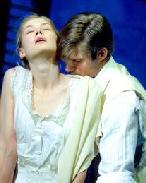SITE GUIDE
SEARCH
REVIEWS
FEATURES
NEWS
Etcetera and
Short Term Listings
LISTINGS
Broadway
Off-Broadway
NYC Restaurants
BOOKS and CDs
OTHER PLACES
Berkshires
London
California
DC
Philadelphia
Elsewhere
QUOTES
On TKTS
PLAYWRIGHTS' ALBUMS
LETTERS TO EDITOR
FILM
LINKS
MISCELLANEOUS
Free Updates
Masthead
Writing for Us
A CurtainUp  London Review
London Review
 London Review
London ReviewSummer and Smoke
|
I’m more afraid of your soul than you’re afraid of my body.
---- John |

Rosamund Pike as Alma Winemiller and Chris Carmack as John Buchanan
(Photo: Catherine Ashmore) |
The central character is the unmarried daughter of a preacher, Miss Alma (Rosamund Pike), who is slightly neurotic yet romantically idealistic. We see her strict, moralistic father (Christopher Ravenscroft) and her mother (Angela Down) whose insanity expresses itself in a childish selfishness, continually demanding ice cream, extravagantly plumed hats, cigarettes and committing generally embarrassing acts. The play’s crux is Alma’s unrequited love for her neighbour and former childhood friend: the handsome but dissolute and weak Dr John Buchanan Jnr (Chris Carmack).
The play’s ensemble also gives us a glimpse of 1920s Mississippi society, with individuals such as Rosa (Hanne Steen) the daughter of a Mexican casino owner, who shot from poverty to wealth based on the skills of a single fighting cock; Nellie the ostracised daughter of a loose woman (Talulah Riley) and several members of Alma’s respectable club: the geeky Roger (Tom Lawrence), Vernon (Michael Brown) who threatens to read out his megalith of a verse drama and the maliciously gossipy Mrs Bassett (Kate O’Toole).
It is the lead performances from Rosamund Pike and Chris Carmack which really clinch the success of this production. Rosamund Pike’s very fine and sympathetic portrayal shows a delicate Alma who combines fragility with repressed passion. Utterly isolated and full of impossible yearning, this role is incredibly affecting. On the basis of this part, it is clear that Rosamund Pike is quickly becoming one of the UK’s leading actresses. Chris Carmack gave her excellent support as the weak-willed epicurean – enjoying women, gambling and alcohol until tragedy converts him towards a more serious life.
The design is attractive and stylish but not especially reminiscent of the American South. This production would have benefited from more evidence of the stifling heat to mirror the oppressively judgmental society, or could at least have given us the background sound of cicadas. Onstage is a prominent fountain statue of an angel of eternity. This stone figure grows to possess symbolic power: both how Alma (whose name means ‘soul’ in Spanish) appears to others and an emotionless standard which she ultimately does not live up to. The two houses where Alma and John live are seamlessly juxtaposed with slatted blinds which let in beautiful lines of light. Their closeness highlights the fact that the object of Alma’s desire is unbearably close and, whilst facing no physical barrier, is still insurmountably hopeless.
This is a quietly heartrending tragedy revolving around the very believable character of Alma, made poignant by Rosamund Pike’s exquisite performance. With elements of Chekhov, we see the imprisoning attitudes of a society with vicious double standards. Adrian Noble’s production wisely does not exaggerate the obvious symbolism inherent in the script, so we get a naturalistic, very human and elegiac drama.
Editor's Note: For more about Tennessee Williams and links to otherreviews of his plays, see the Williams page in our Author's Album.
|
SUMMER AND SMOKE
Written by Tennessee Williams Directed by Adrian Noble Starring: Rosamund Pike and Chris Carmack With: Christopher Ravenscroft, Angela Down, Michael Brown, Hannah Stokely, David Killick, Hanne Steen, Talulah Riley, Tom Lawrence, Kate O’Toole, Sebatian Abineri Design: Peter McKintosh Costume design: Deirdre Clancy Lighting: Peter Mumford Sound: John Leonard Music: Simon Lee Running time: Two hours 20 minutes with one interval Box Office: 0870 890 1101 Booking to 7th February 2007 Reviewed by Charlotte Loveridge on 19th October 2006 performance at the Apollo Theatre, Shaftesbury Avenue, London W1 (Tube: Piccadilly Circus) |




